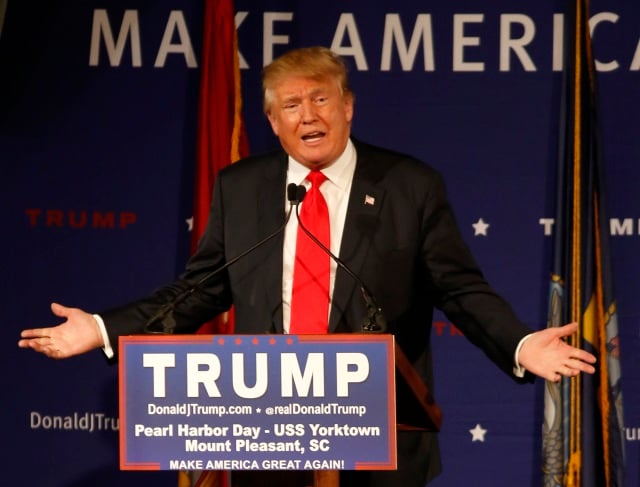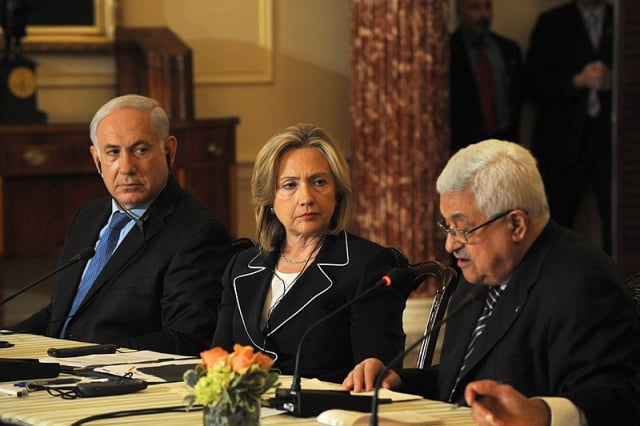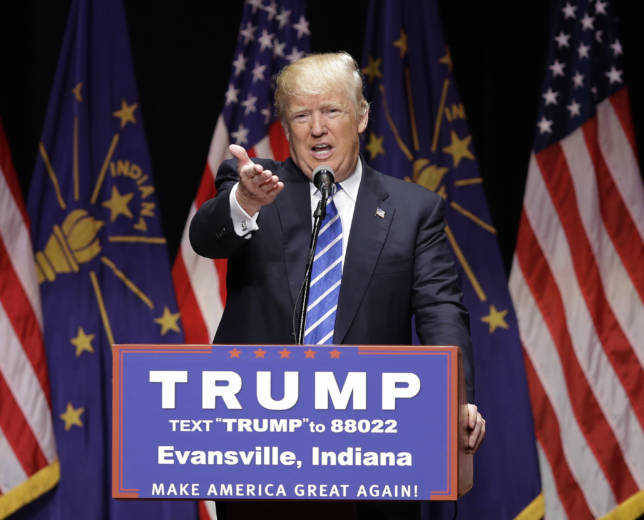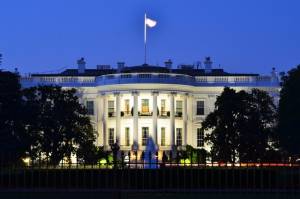In one of the most contentious US election periods in recent memory, the race to the White house appears to have been whittled down to Democratic presidential front-runner Hillary Clinton and Republican presidential front-runner Donald Trump, both of whom have a large following and have a good chance of becoming president. But where do they stand on Israel?
Israelis and supporters of Israel around the world are eyeing the US 2016 presidential race with particular interest. Democratic presidential front-runner Hillary Clinton and Republican presidential front-runner Donald Trump are both big names and they cannot be more different – both as people and as presidential candidates. And while we know where the candidates stand on issues of domestic policy, what supporters of Israel want to know is, where do they stand on foreign policy and, specifically, the issues relevant to Israel?
Will they remain committed to protecting Israel’s concerns? Will they side with Israel or the Palestinians on controversial issues? Will they force Israel to make dangerous concessions? Where do they stand on Judea and Samaria? Will the US continue to defend Israel at the UN? What will their relationship with Israel’s prime minister look like? Will they enforce the Iran Nuclear Deal and punish Iran for violations? Will they go to war with Iran if Iran demonstrates it is ready to attack Israel?
These are important questions and Israel’s citizens and supporters want answers.
What Clinton and Trump are Saying
On Protecting Israel
Clinton stressed that her commitment to Israel is “not just policy; it’s personal.” She said she had worked throughout her career “to further the relationship” and “enhance Israel’s security.”

Republican presidential candidate Donald Trump. (AP Photo/Mic Smith)
In an interview with the Atlantic‘s Jeffrey Goldberg in 2014, Clinton was quick to identify anti-Semitism as an important motivating factor in criticism of Israel. “…we do see this enormous international reaction against Israel, and Israel’s right to defend itself, and the way Israel has to defend itself. This reaction is uncalled for and unfair.” She went on, “You can’t ever discount anti-Semitism, especially with what’s going on in Europe today…So there’s something else at work here than what you see on TV.”
In an address to AIPAC in March, Clinton challenged Trump’s qualifications to be commander-in-chief, portraying him as dangerous and lacking firm convictions.
“We need steady hands, not a president who says he’s neutral on Monday, pro-Israel on Tuesday, and who-knows-what on Wednesday because ‘everything’s negotiable’,” Clinton said. “Well, my friends, Israel’s security is non-negotiable.”
Trump has declared he “will be very good to Israel.” He has accused President Obama and US Secretary of State John Kerry of “selling Israel out,” and said that the US should do everything possible to protect and defend it. “They’ve always been there for us and we should be there for them,” he declared.
Trump says he has always been loyal to Israel and “would do more for Israel than anybody else.”
He has also said he would ensure no “daylight” exists between the US and Israel.
On the Israeli-Palestinian conflict
In an interview with the New York Jewish Week in April, Clinton slammed the Palestinians for failing to seize past opportunities for peace with Israel, and said she had a “long memory” of Palestinian inaction on the peace front. Clinton has also rejected the idea that Israel is primarily to blame for the failure of peace efforts.

PM Netanyahu (L), former US Secretary of State Hillary Clinton and PA head Mahmoud Abbas. (Moshe Milner/GPO)
Clinton stressed the need to maintain “the hope of peace,” and highlighted the importance of leveraging “the converging interests between Israel and Arab states to move forward together toward a two-state vision of a Jewish and democratic Israel with secure and recognized borders.”
In an interview with Fareed Zakaria on CNN in 2014, Clinton said, “I’m a strong supporter of Israel, a strong supporter of their right to defend themselves. But the continuing settlements, which have been denounced by successive American administrations on both sides of the aisle, are clearly a terrible signal to send if, at the same time, you claim you’re looking for a two-state solution.”
In an interview with The Associated Press in December 2015, Trump said he was interested in making a “lasting peace,” and that required the commitment of both sides, something he wasn’t sure existed. He also said he wants to remain neutral. This raised eyebrows among Israel-supporters.
“There is no moral equivalency,” between Israel’s army and Palestinian terrorists Trump asserted in another interview. “You cannot achieve peace if terrorists are treated as martyrs.”
Asked whether Israel should stop building in Judea and Samaria, Trump responded, “No… I think Israel should have – they really have to keep going. They have to keep moving forward.”
On the UN
Clinton has expressed her opposition to imposed UN resolutions on the Israeli-Palestinian conflict.
Trump has also vowed to veto any attempt by the UN to impose a solution on Israel.
On Prime Minister Benjamin Netanyahu
Clinton has said she and Netanyahu “get along well.” “I’ve known Bibi a long time and I have a very good relationship with him, in part because we can yell at each other, and we do,” she told CNN. “And I was often the designated yeller.”
In March 2010, Clinton made a now-infamous phone call to Netanyahu in which she castigated and threatened the prime minister for nearly an hour and made a list of demands he would need to fulfill in order to salvage the US-Israel relationship.

Former US Secretary of State Clinton and Prime Minister Netanyahu in Jerusalem. (Matty Stern/U.S. Embassy Tel Aviv/FLASH90)
However, Clinton has promised to invite the Israeli prime minister to the White House in her first month in office if elected president.
In her 2014 memoir “Hard Choices,” in which Clinton portrays other leaders in a mostly flattering way, her muted description of Netanyahu as a “complicated figure” is obvious.
Trump has a close personal relationship with Netanyahu, and taped a 2013 video endorsing his candidacy in the Israeli elections.
On Iran
In 2015, Clinton said, “I want the Iranians to know that if I’m president, we will attack Iran. In the next 10 years, during which they might foolishly consider launching an attack on Israel, we would be able to totally obliterate them.”
In March, she said, “…it’s not good enough to trust and verify. Our approach must be distrust and verify… If I’m elected, the leaders of Iran will have no doubt that if we see any indication that they are violating their commitments not to seek, develop or acquire nuclear weapons, the United States will act to stop it, and that we will do so with force if necessary.”
Trump said his “number one priority” is to dismantle the nuclear deal with Iran. He will do so, he said, by aggressively policing the deal, and not by “ripping it to shreds on day one” in the Oval Office.
“Under a Trump administration Iran will never be allowed to have that nuclear weapon,” he added.
Analysis
Hillary R. Clinton
While Clinton’s Israel credentials are strong, many in Israel and abroad fear her presidency will simply mirror Obama-style diplomacy or even Bill Clinton-style diplomacy with regard to Israel and the Palestinians – none of which ever really worked.

Democratic presidential candidate Hillary Clinton speaks at the AIPAC conference Monday in Washington. (AP/Andrew Harnik)
Clinton’s closeness to Obama and her time as Secretary of State in his cabinet worries Israelis since, even though she has supported Israel in many instances, there were a number of times when she didn’t.
Israelis were outraged in 1999 when Clinton kissed Yasser Arafat’s wife after the latter gave a speech filled with venomous lies about Israel.
Clinton still appears to adhere to the Palestinian narrative that the settlements are at the root of the Israeli-Palestinian conflict and she, like the State Department she once worked at and the White House she once lived in, has fallen hook, line and sinker for this terribly false lie.
And then there’s Sid Blumenthal, Clinton’s friend and confidante to whom she turns for advice, who has recommended she read writings by his son Max, who compares Israel to Nazis.
Can Clinton stand strong with Israel and strengthen the weakened US-Israel relationship? Many believe she can, but she will need to demonstrate that she is distancing herself from Obama and his negative attitude toward Israel.
Donald J. Trump
In what many consider to be a silly declaration, Trump insists on highlighting the fact that he served as grand marshal for the Israel parade in New York in 2004, which, frankly, is nothing more than a symbolic and minor role.

Republican presidential candidate Donald Trump. (AP/Darron Cummings, File)
There have been a number of instances when Trump appeared less than knowledgeable on the issues relevant to Israel and this of course is a cause for concern among Israelis and Israel-supporters.
Trump’s lack of foreign policy experience and general knowledge is worrying and it is up to him to surround himself with the right advisers and prove that he can tackle the main issues in a rational way. Trump will have to prove himself through actions and demonstrate that he truly does support Israel.
Clinton has the resume, but, as Geraldo Rivera put it, while Trump may not be able to steamroll her in the coming months the way he did to the 16 other Republican candidates over the last year, he will be able to keep her off-balance enough, making this race a likely close call.
Clinton or Trump?
The latest Peace Index poll by the Israel Democracy Institute, released on Monday, shows that Israelis believe Clinton in general will serve Israel’s interests in the White House better than Trump. But a majority believe Trump will be more committed to safeguarding Israel’s security.
So of two candidates with relatively pro-Israel sentiments, Israelis will have to choose between one who has been deeply involved in the Israeli-Palestinian conflict and one who has no real foreign policy experience. One is part of establishment politics and one is anti-establishment. One has immense experience in government and the other has none.
Both have expressed strong pro-Israel views, though Clinton is seen as most likely to be more heavily influenced by pro-Palestinian views and this worries pro-Israel supporters. Trump’s controversial statements on Israel and lack of knowledge, coupled with the perception that he might not be as pro-Israel as he tries to portray, worries voters as well.
The Next President Must Be Realistic

(shutterstock)
Author Stephen Sestanovich writes that nearly every new president since Truman felt the need to change America’s course on foreign policy. This is what Bill Clinton did. It’s what George W. Bush did. It’s what Barack Obama did. And it is likely what the next president will do as well.
The question is, what does this mean for Israel this time around?
What is clear, is that three key foreign policy misunderstandings by the Americans need to change. The first misconception, the idea that the Israeli-Palestinian conflict is the center of the Middle East’s troubles, must be corrected. Solving the Israeli-Palestinian conflict will not resolve the historical Sunni-Shiite conflict in the Middle East. Period.
The second misconception, the misplaced notion that the “settlements” are the root cause of the Israeli-Palestinian conflict, is categorically false and an utter misrepresentation of actual facts and history.
The third misconception, the idea that distancing the US from Israel will gain cooperation from the Arabs, is also false.
The next president must eradicate once and for all these damaging misconceptions from American thinking.
Will the next president stand staunchly and unwavering with Israel? Israelis and supporters of Israel certainly expect so.
By: Eric Miller, United with Israel

